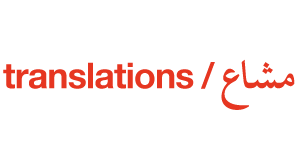download readings
Philosophy & Politics, readings curated by Andrea Cassatella
Derrida, J., & Venuti, L. (2001). What Is a “Relevant” Translation? Critical Inquiry, 27(2), 174-200.
Asad, Talal. (2018) Secular Translations: Nation State, Modern Self, and Calculative Reason. New York: Columbia University Press.
Literature & History, readings curated by Max Weiss
Hilary Kilpatrick, “Commitment and Literature: The Case of Ghassān Kanafānī.” British Journal of Middle Eastern Studies Vol.3, No. 1 (1976): 15–19.
Roger Allen, “Introduction,” in All That’s Left to You: A Novella and Short Stories (Northampton, MA: Interlink Books, 2004), xi-xix.
Ghassan Kanafani, Umm Saʿd (1969)
Karen E. Riley, “Ghassan Kanafani: A Biographical Essay,” in Palestine’s Children: Returning to Haifa and Other Stories (Boulder, CO: Lynne Rienner, 2000), 1-12
Friedrich Schleiermacher, “On the Different Methods of Translating” trans. Susan Bernofsky in The Translation Studies Reader, 43-63.
Walter Benjamin, “The Task of the Translator” trans. Harry Zohn in Illuminations, 69-82.
Lawrence Venuti, “The Formation of Cultural Identities” in The Scandals of Translation: Toward an Ethics of Difference, 67-87.
Lawrence Venuti, “Invisibility” and “Call to Action” in The Translator’s Invisibility: A History of Translation, 1-42, 307-316.
Jacques Derrida, “What Is a “Relevant” Translation?” trans. Lawrence Venuti, Critical Inquiry, Vol. 27, No. 2 (Winter, 2001): 174-200.
Robyn Creswell “Is Arabic Untranslatable?” Public Culture, Vol. 28, No. 3 (2016): 447-456.
Image, Sound & Media, readings curated by Laura Menchaca Ruiz
MacDougall, David. 2006. “Introduction: Meaning and Being.” In The Corporeal Image: Film, Ethnography, and the Senses, Princeton, N.J: Princeton University Press, 1–9.
Sharpe, Christina. (2019) “Beauty Is a Method.” e-flux journal (105).
hooks, bell. (2015) ““Homeplace (a site of resistance)”” in Yearning: Race, Gender, and Cultural Politics. New York: Routledge, Taylor & Francis Group.
Cartography & Space, readings curated by Nadine Fattaleh
Michel De Certeau, “Walking in the City,” in The Practice of Everyday Life, trans. Steven Rendall (Berkeley: University of California Press, 2011): 91-110.
Denis Wood and John Krygier, “C’est ne pas le monde.” Rethinking Maps: New Frontiers in Cartographic Theory (2007): 189-219.
Linda Quiquivix, “When the Carob Tree Was the Border: On Autonomy and Palestinian Practices of Figuring it Out,”
Capitalism Nature Socialism 24, no. 3 (170-189): short selections
Jorge Luis Borges “On Exactitude in Science,” in Collected Fictions, trans. Andrew Hurley (New York: Penguin Books, 1999)
Eyal Weizman, “Walking Through Walls,” in Hollow Land: Israel’s Architecture of the Occupation (New York: Verso Books, 2007): 185-218.
Hassan Khan, Mohieddin Ellabbad and Nawal Traboulsi, “Revolution For Kids: Dar El Fata El Arabi, Recollected,”
Bidoun (Winter 2010): https://www.bidoun.org/articles/revolution-for-kids/
Grassroots & Community Organizing, readings curated by Ziad Faraj
Faraj, Ziad. (Manuscript). “Social Work Profession in Palestine: Evolution within the Colonial Occupation Context.” N.B.: Not for dissemination.
Azzam, Fateh. 2014. “NGOs vs. Grassroots Movements: A False Dichotomy.” al-shabaka.
Hammami, Rema. 1995. “NGOs: The Professionalisation of Politics.” Race & Class 37(2): 51–63.
Dana, Tariq. 2013. “Palestinian Civil Society: What Went Wrong?” al-shabaka.
Reisch, M., and J. S. Jani. 2012. “The New Politics of Social Work Practice: Understanding Context to Promote Change.” British Journal of Social Work 42(6): 1132–50.
